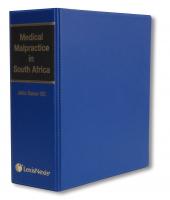Principles of Delict
Principles of Delict serves as a practical first port of call to the South African law of delict.
One Year Subscription Only Terms
Subscribers receive the product(s) listed on the Order Form and any Updates made available during the annual subscription period. Shipping and handling fees are not included in the annual price.
Subscribers are advised of the number of Updates that were made to the particular publication the prior year. The number of Updates may vary due to developments in the law and other publishing issues, but subscribers may use this as a rough estimate of future shipments. Subscribers may call Customer Support at 800-833-9844 for additional information.
Subscribers may cancel this subscription by: calling Customer Support at 800-833-9844; emailing customer.support@lexisnexis.com; or returning the invoice marked 'CANCEL'.
If subscribers cancel within 30 days after the product is ordered or received and return the product at their expense, then they will receive a full credit of the price for the annual subscription.
If subscribers cancel between 31 and 60 days after the invoice date and return the product at their expense, then they will receive a 5/6th credit of the price for the annual subscription. No credit will be given for cancellations more than 60 days after the invoice date. To receive any credit, subscriber must return all product(s) shipped during the year at their expense within the applicable cancellation period listed above.
Product description
Principles of Delict serves as a practical first port of call to the South African law of delict.
The Fourth Edition surveys cases since 2005, presents a comprehensive overview of developments in the law and illustrates how the Constitutional Court and the Supreme Court of Appeal, especially, have shaped traditional principles to coincide with modern human rights values. It follows the LAWSA format of focusing primarily on case law and extracting therefrom general principles that may guide those who advise on and apply the law of delict.
Note: The online price varies according to package chosen and number of users. Our sales agents will provide a quote on request.
Table of contents
Introduction
Delict as source of obligations
Delict: general nature
Essential elements
Delict distinguished from crime
Delict distinguished from breach of contract
Delict distinguished from infringements of the bill of rights
Historical Background
Roman origin
The Aquilian Action
Roman law
Roman-Dutch law
The Actio Iniuriarum
Roman law
Roman-Dutch law
Roman-Dutch Law Actions
Action of dependants
Action for pain and suffering
Actions of parents and employers
The Basis of Liability
Roman law
Medieval law
Natural law
Roman-Dutch law
Delict in a Constitutional Era
The influence of the Constitution
Direct application
Indirect application
Constitutional values
Transforming legal values: customary law influences
Transforming legal values: Muslim and Hindu cultures
Application of the constitutional principles
Liability in South African Law
General basis
First principles
Actio doli
Actio quod metus causa
Actio ad exhibendum
General
Actio de pauperie
Actio de pastu
Actio de feris
Actio de effusis vel deiectis; actio positi vel suspensi
Condictio furtiva
Actio aquae pluviae arcendae; interdictum quod vi aut clam
Vicarious liability: general principles
Vicarious liability: employers
Vicarious liability: mandators
Vicarious liability: motor vehicle owners
Vicarious liability: possible other categories
Independent contractors
Harm
Delict and harm
Patrimonial loss
Non-patrimonial loss
Pain and suffering
Injury to personality
Prospective or future harm
Title to Sue
General
Government and public figures
Juristic persons
The Bill of Rights
Dependants
Breadwinners
Children
Employers
Employees
Concepts
Actio legis Aquiliae
Actio iniuriarum
Action for pain and suffering
Exclusion and Immunity from Suit
Concurrence of actions: general
Delict and breach of contract: concurrence of actions
Delict and a constitutional remedy: concurrence of actions
Statutory exclusions
Exclusion clauses
General
Parliamentary immunity
Conduct
Requisites
Positive conduct and omissions
Wrongfulness
Basic requirement
Wrongfulness and causation
Wrongfulness and fault
The criterion for determining wrongfulness
The role of rights and duties in determining wrongfulness
The role of forseeability in determining wrongfulness
The role of fault in determining wrongfulness
The Bill of Rights
Infringement of a right
Breach of a legal duty
The duty of care
Liability for omissions
Liability for statements
Fraudulent misrepresentation
Liability for psychiatric injury
Liability for pure economic loss
Interference with contractual relations
Unlawful competition: general principles
Unlawful competition: passing off
Unlawful competition: confidential information and trade secrets
Boycotts, strikes, demonstration and pickets
Manufacturers' liability
Unlawful competition: injurious falsehood
Breach of a statutory duty or negligent exercise of a statutory power
Dependants
Trespassers
Wrongful detention of goods
Infringement of the right to corpus: bodily integrity
Infringement of the right to corpus: deprivation of liberty
Infringements of dignitas
Infringements of dignitas: privacy
Infringements of dignitas: identity
Infringement of fama: defamation
Infringement of fama: defamation – publication
Infringement of fama: defamation – defamatory material
Infringement of fama: defamation – reference to plaintiff
Infringement of fama: malicious prosecution
Abuse of rights
Defences: Grounds of Justification
Grounds of justification: general
Grounds of justification: onus of proof
Necessity
Defence
Statutory authority
The exercise of a right
Parental authority
Public office
Legal practitioners
Obedience to orders
Provocation
Volenti non fit iniuria: general
Volenti non fit iniuria: requirements
Volenti non fit iniuria: legally-acceptable consent
Volenti non fit iniuria: a unilateral act
Contributory intention
Truth and public benefit
Fair comment
Privileged occasion: general principles
Privileged occasion: exercising a right or discharging a duty
Privileged occasion: judicial or quasi-judicial proceedings
Privileged occasion: reports on proceedings
Reasonable publication
Public interest privilege
Jest
Fault
General
Accountability
Intent (dolus)
Liability of media under the actio iniuriarum
Intent and motive
Defences excluding intent
Defences excluding intent: mistake
Defences excluding intent: jest
Defences excluding intent or accountability: provocation
Defences excluding intent or accountability: intoxication
Defences excluding intent or accountability: emotional distress
Defences excluding accountability: capacity
Intent: onus of proof
Negligence: general
Negligence: the reasonable person
Negligence: the reasonable person's knowledge
Negligence: the reasonable person's subjective beliefs, attitude and approach
Negligence: the reasonable person's mental capacity
Negligence: the reasonable person's physical attributes
Negligence: the reasonable person's skills
Negligence: the test
Negligence: onus of proof
Negligence: res ipsa loquitur
Negligence: foreseeability of harm
The foreseeable plaintiff
Negligence: application of the foreseeability test
Negligence: application of the foreseeability issue
Negligence: application of the preventability issue
Negligence: general practice
Negligence: breach of a statutory duty
Negligence: legitimate assumptions
Negligence: errors of judgment
Negligence: circumstances
Negligence: sudden emergency
Negligence: danger to children
Negligence: organs of state
Negligence: experts
Negligence: beginners
Negligence: children
Causation
Roman and Roman-Dutch law
Causation: two elements
Factual causation: general
Factual causation: condition sine qua non
Factual causation: a flexible approach
Factual causation: application of the condition sine qua non test in omission cases
Factual causation: multiple causes
Legal causation
Intended consequences
Direct consequences
Novus actus interveniens
Foreseeability
Adequate cause
Legal causation: multiple causes
Remedies
Available remedies
Self-help
Interdict
Retraction and apology
Damages
Purpose of delictual damages
General and special damages
Actual loss
Damage to property
Expenses
Loss of support
Loss of earnings and of earning capacity
Illegal earnings
Prospective loss
Once and for all rule
Psychiatric injury
Pain and suffering
Solatium
Collateral benefits or res inter alios actae
The award
Previous awards
Constitutional values
Subjective value
Inflation
Tax
Time of assessment
Interest
Currency
Mitigation
Reduction and Apportionment of Damages
Contributory negligence: background
Contributory fault
Apportionment between plaintiff and defendant
Contributory intent
Common law
Apportionment of Damages Act: section 2
Nature of the proceedings involving joint wrongdoers
Multiple plaintiffs and defendants



